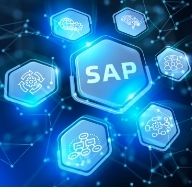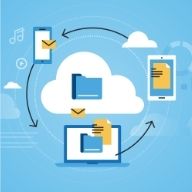Cloud ERP – The next normal in the ERP world

Digital & Technology
268 week ago — 4 min read
It hasn’t been much time to the era when ERP (Enterprise Resource Planning) systems boomed into the market and surprised the world with the power of automation. Not just large but even small to medium sized enterprises are now using ERP systems and embracing this in their journey of success. A smart, reliable, and intelligent enterprise ready platform like SAP Business One has transformed the way businesses used to function. SAP Business One streamlines the workflow, enhances efficiency and renders accuracy to data empowering leaders to make smart decisions faster.
But nothing can stand still for a longer time and so is the case with the ERP systems. Just as we realised and understood the importance of having an ERP system in our businesses, it is now time to realise the significance of the upgraded model of ERP systems. That is, cloud-based ERP systems, like cloud-based SAP Business One.
Also read: Everything you need to know about ERP - SAP Business One
The Coronavirus pandemic has impacted the whole world. The crisis is still not over but the government is ending the lockdown gradually so that lives can be brought back to the normal track. However, it is not that easy as it sounds.
Had it been Cloud-ERP in place of ERP on-premise in the business, the workflow would have been as normal as it used to be. How? Continue reading and you’ll get to know.
Benefits of adopting cloud ERP system
-
Provided as SaaS cloud ERP
Unlike on-premise, cloud ERP systems don’t need a large infrastructure to get installed. The provider supplies the system in the form of software as a service (SaaS). That means, the system can be operated anytime, anywhere and on any device using a browser. Now remember, the time your employees were forced to work from home but didn’t have access to information. With Cloud ERP systems, there’s no VPN or any other thing required to operate the business functions.
-
Secured data and data flow
Cloud ERP stores and transfers your data in encrypted form that is the data reaches the assigned person in an encrypted manner ensuring the complete security and safety of the confidential information. Also, with the increasing BYOD culture, where employees bring their own device to the office or work from home with their own devices, the cloud ERP ensures that your business information is safe at every end.
-
Reduced cost of installation and quicker updates
No software could be kept running without timely updates. The same goes with ERP systems. Unlike on-premise ERP systems which take days of updates, the same can happen in cloud ERP in much lesser time without hampering the regular daily tasks of the office.
-
No hardware and maintenance issues
With machinery, come their issues. But, with cloud ERP systems, there’s absolutely no hardware and maintenance cost required to keep the software running. Plus the provision to easily scale up or scale down the number of users makes the ERP even more cost-effective.
There you go—solid reasons to switch to cloud-based SAP B1 and make an impact in your business.
Also read: Here's the digital Covid-19 recovery plan and 3 ways to do it
Image source: shutterstock.com
To explore business opportunities, link with me by clicking on the 'Invite' button on my eBiz Card.
Disclaimer: The views and opinions expressed in this article are those of the author and do not necessarily reflect the views, official policy or position of GlobalLinker.
Network with SMEs mentioned in this article
View Sonia 's profile
Most read this week














Comments (2)
Share this content
Please login or Register to join the discussion